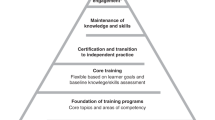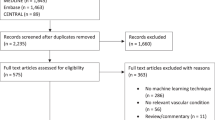Abstract
Assessment of medical specialists was introduced to ensure patient safety and to maintain professional knowledge. Cardiovascular specialist assessment is challenging, as the ongoing development of new technologies is associated with increased requirements for up-to-date training and acquisition of new skills. The cardiovascular specialties include cardiology, vascular interventional radiology, cardiac surgery and vascular surgery. Assessment within these disciplines involves evaluation of knowledge in addition to technical and nontechnical skills, a process that is termed recertification or maintenance of certification. Increasingly, there is a demand for professional accountability through recertification because of concerns about professional negligence and increased awareness of medical errors. In this article we describe the process of recertification in different geographical regions and discuss the role of current tools used to recertify cardiovascular specialists and, in particular, how their use can contribute to the requirements of patient care.
Key Points
-
Recertification is a process of self-regulation within the medical profession that aims to protect patients from specialists who perform poorly
-
Continuing medical education, to ensure up-to-date knowledge and skills, is a key element of recertification
-
Objective assessment and continuing medical education should be closely associated with each other during the process of recertification
-
Further research is required to identify and develop tools with the highest level of validity and reliability for education and assessment
This is a preview of subscription content, access via your institution
Access options
Subscribe to this journal
Receive 12 print issues and online access
$209.00 per year
only $17.42 per issue
Buy this article
- Purchase on Springer Link
- Instant access to full article PDF
Prices may be subject to local taxes which are calculated during checkout





Similar content being viewed by others
References
Bajona, P. Hybrid cardiac surgery: a resident's perspective. Arch. Surg. 144, 207–208 (2009).
DeMaria, A. N. The morphing of cardiovascular specialists. J. Am. Coll. Cardiol. 45, 960–961 (2005).
Sanderson, R. G. Ethical and legal concerns in relationships with cardiologists. Ann. Thorac. Surg. 72, 3–5 (2001).
Cohen, M. S. et al. Mentorship, learning curves, and balance. Cardiol. Young (17 Suppl. 2), 164–174 (2007).
Batmangelich, S. & Adamowski, S. Maintenance of certification in the United States: a progress report. J. Contin. Educ. Health Prof. 24, 134–138 (2004).
Buyske, J. For the protection of the public and the good of the specialty: maintenance of certification. Arch. Surg. 144, 101–103 (2009).
Academy of Medical Royal Colleges. Revalidation. Academy of Medical Royal Colleges [online], (2009).
American Board of Medical Specialties. ABMS Maintenance of Certification. The American Board of Medical Specialties [online], (2009).
Levinson, W. Revalidation of physicians in Canada: are we passing the test? CMAJ 179, 979–980 (2008).
Darzi, A. High quality care for all: NHS Next Stage Review final report. Department of Health [online], (2008).
Bridgewater, B. et al. Has the publication of cardiac surgery outcome data been associated with changes in practice in northwest England: an analysis of 25,730 patients undergoing CABG surgery under 30 surgeons over eight years. Heart 93, 744–748 (2007).
Learning from Bristol: the report of the public inquiry into children's heart surgery at the Bristol Royal Infirmary 1984–1995. The Bristol Royal Infirmary Inquiry [online], London: Stationery Office (2001).
Kohn, L. T., Corrigan, J. M. & Donaldson, M. S. (Eds) To Err is Human: Building a Safer Health System (Institute of Medicine, National Academy Press, Washington DC, 1999).
General Medical Council. Good Medical Practice (2006). General Medical Council [online], (2006).
Dauphinee, W. D. Self regulation must be made to work. BMJ 330, 1385–1387 (2005).
European Commission Health & Consumer Protection Directorate-General. Report on the work of the High Level Group in 2006. European Commission [online], (2006).
Merkur, S., Mossialos, E., Long, M. & McKee, M. Physician revalidation in Europe. Clin. Med. 8, 371–376 (2008).
Archer, J., Norcini, J., Southgate, L., Heard, S. & Davies, H. Mini-PAT (peer assessment tool): a valid component of a national assessment programme in the UK? Adv. Health Sci. Educ. Theory Pract. 13, 181–192 (2008).
Davies, H. A. & Archer, J. C. Multi source feedback using Sheffield Peer Review Assessment Tool (SPRAT)—development and practical aspects. Clin. Teacher 2, 77–81 (2005).
Crossley, J. et al. Can a district hospital assess its doctors for re-licensure? Med. Educ. 42, 359–363 (2008).
Lockyer, J. M. & Violato, C. An examination of the appropriateness of using a common peer assessment instrument to assess physician skills across specialties. Acad. Med. 79, S5–S8 (2004).
Ramsey, P. G. et al. Use of peer ratings to evaluate physician performance. JAMA 269, 1655–1660 (1993).
Vogt, V. Y., Givens, V. M., Keathley, C. A., Lipscomb, G. H. & Summitt, R. L. Jr Is a resident's score on a videotaped objective structured assessment of technical skills affected by revealing the resident's identity? Am. J. Obstet. Gynecol. 189, 688–691 (2003).
Hance, J. et al. Objective assessment of technical skills in cardiac surgery. Eur. J. Cardiothorac. Surg. 28, 157–162 (2005).
Southgate, L. & Pringle, M. Revalidation in the United Kingdom: general principles based on experience in general practice. BMJ 319, 1180–1183 (1999).
Davies, H. et al. Specialty-specific multi-source feedback: assuring validity, informing training. Med. Educ. 42, 1014–1020 (2008).
Spencer, F. Teaching and measuring surgical techniques: the technical evaluation of competence. Bull. Am. Coll. Surg. 63, 9–12 (1978).
Maisonneuve, H. et al. Continuing medical education and professional revalidation in Europe: five case examples. J. Contin. Educ. Health Prof. 29, 58–62 (2009).
van der Vleuten, C. P. M. The assessment of professional competence: developments, research and practical implications. Adv. Health Sci. Educ. Theory Pract. 1, 41–67 (1996).
Choudhry, N. K., Fletcher, R. H. & Soumerai, S. B. Systematic review: the relationship between clinical experience and quality of health care. Ann. Intern. Med. 142, 260–273 (2005).
Durso, F. T. & Sethumadhavan, A. Situation awareness: understanding dynamic environments. Hum. Factors 50, 442–448 (2008).
Fletcher, G. et al. Anaesthetists' non-technical skills (ANTS): evaluation of a behavioural marker system. Br. J. Anaesth. 90, 580–588 (2003).
Undre, S., Sevdalis, N., Healey, A. N., Darzi, A. & Vincent, C. A. Observational teamwork assessment for surgery (OTAS): refinement and application in urological surgery. World J. Surg. 31, 1373–1381 (2007).
Sevdalis, N. et al. Reliability of a revised NOTECHS scale for use in surgical teams. Am. J. Surg. 196, 184–190 (2008).
Flin, R. et al. Teaching surgeons about non-technical skills. Surgeon 5, 86–89 (2007).
Miller, G. E. The assessment of clinical skills/competence/performance. Acad. Med. 65, S63–S67 (1990).
Epstein, R. M. & Hundert, E. M. Defining and assessing professional competence. JAMA 287, 226–235 (2002).
Patil, N. G., Cheng, S. W. & Wong, J. Surgical competence. World J. Surg. 27, 943–947 (2003).
Joice, P., Hanna, G. B. & Cuschieri, A. Errors enacted during endoscopic surgery—a human reliability analysis. Appl. Ergon. 29, 409–414 (1998).
Reznick, R., Regehr, G., MacRae, H., Martin, J. & McCulloch, W. Testing technical skill via an innovative 'bench station' examination. Am. J. Surg. 173, 226–230 (1997).
Beard, J. D., Choksy, S. & Khan, S. Assessment of operative competence during carotid endarterectomy. Br. J. Surg. 94, 726–730 (2007).
Tang, B., Hanna, G. B., Bax, N. M. & Cuschieri, A. Analysis of technical surgical errors during initial experience of laparoscopic pyloromyotomy by a group of Dutch pediatric surgeons. Surg. Endosc. 18, 1716–1720 (2004).
Tang, B., Hanna, G. B., Joice, P. & Cuschieri, A. Identification and categorization of technical errors by Observational Clinical Human Reliability Assessment (OCHRA) during laparoscopic cholecystectomy. Arch. Surg. 139, 1215–1220 (2004).
Ahmed, K., Nagpal, K. & Ashrafian, H. Do we need to train assessors? Med. Educ. 43, 389 (2009).
Allen, I. Doctors crossing borders: Europe's new reality. CMAJ 180, 158–161 (2009).
Sharp, L. K., Bashook, P. G., Lipsky, M. S., Horowitz, S. D. & Miller, S. H. Specialty board certification and clinical outcomes: the missing link. Acad. Med. 77, 534–542 (2002).
Neequaye, S. K., Aggarwal, R., Van Herzeele, I., Darzi, A. & Cheshire, N. J. Endovascular skills training and assessment. J. Vasc. Surg. 46, 1055–1064 (2007).
Yule, S., Flin, R., Paterson-Brown, S., Maran, N. & Rowley, D. Development of a rating system for surgeons' non-technical skills. Med. Educ. 40, 1098–1104 (2006).
Wass, V., Van der Vleuten, C., Shatzer, J. & Jones, R. Assessment of clinical competence. Lancet 357, 945–949 (2001).
Acknowledgements
This project is funded by the General Medical Council, UK, and the Academy of Medical Royal Colleges, UK. This article reflects authors' views only, based on the research at Imperial College London, UK.
Author information
Authors and Affiliations
Corresponding author
Ethics declarations
Competing interests
The authors declare no competing financial interests.
Rights and permissions
About this article
Cite this article
Ahmed, K., Ashrafian, H., Hanna, G. et al. Assessment of specialists in cardiovascular practice. Nat Rev Cardiol 6, 659–667 (2009). https://doi.org/10.1038/nrcardio.2009.155
Published:
Issue Date:
DOI: https://doi.org/10.1038/nrcardio.2009.155




